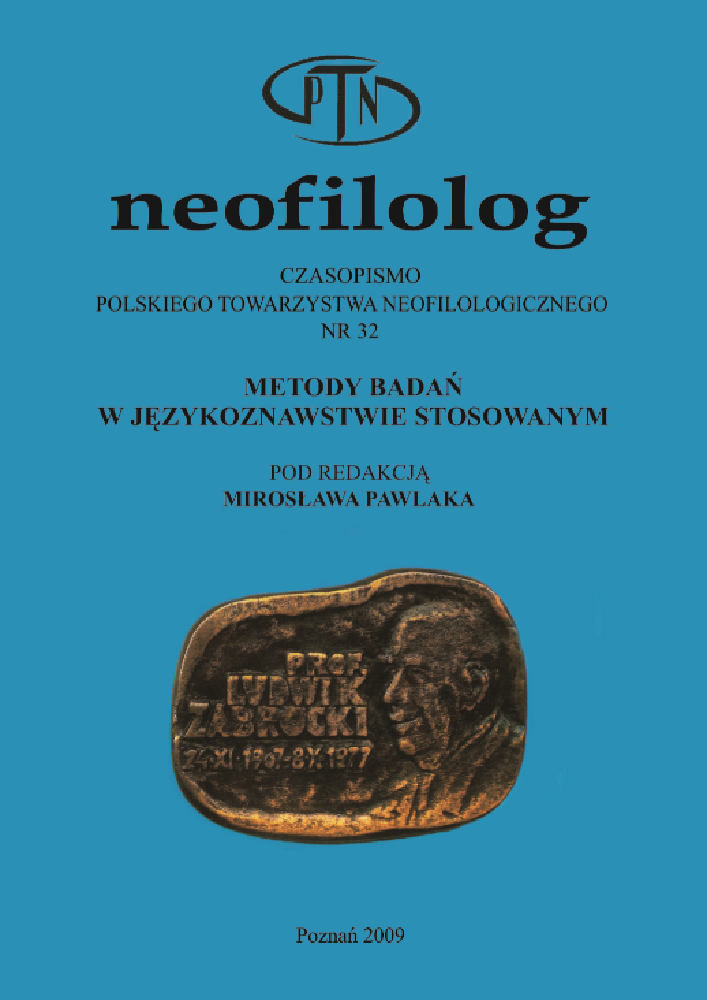Résumé
The purpose of this article is to show how action research is used as a research method in foreign language didactics. Six articles have been chosen from refereed journals and analyzed in respect to such categories as research questions and problems, research aims, the relationship between research participants and researcher, research procedures, data collection methods, results and research quality. This initial analysis reveals that action research studies (1) do not easily fall into one distinct research paradigm, (2) can be both quantitative and qualitative, or mixed, (3) collaboration of research participants is often very limited, and (4) there are problems with quality criteria.
Références
Block, D. 1997. „Learning by listening to language learners”. System 25. 347-360.
Brzeziński, J. 1996. Metodologia badań psychologicznych. Warszawa: Wydawnictwo Naukowe PWN.
Burns, A. 1999. Collaborative action research for English language teachers. Cambridge: Cambridge University Press.
Carr, W. i Kemmis, S. 1986. Becoming critical: Education, knowledge and action research. Lewes, Sussex: Falmer Press.
Cassell, C. i Johnson, P. 2006. „Action research: Explaining the diversity”. Human Relations 59. 783-814.
Crawford Camiciottoli, B. 2003. „Metadiscourse and ESP reading comprehension: An exploratory study”. Reading in a Foreign Language 15. (http://nflrc.hawaii.edu/rfl/. (DW) 15.01.2009).
Edge, J. (red.). 2001. Action research. Alexandria, VA: TESOL.
Ellis, R. 1998. „Teaching and research: Options in grammar teaching”. TESOL Quarterly 32. 39-60.
Gnitecki, J. 2007. Wprowadzenie do pedagogiki ogólnej. Poznań: Wydawnictwo Naukowe Polskiego Towarzystwa Pedagogicznego.
Hall Haley, M. 2004. „Learner-centered instruction and the theory of multiple intelligences with second language learners”. Teachers College Record 106. 163-180.
Herr, K. i Andersen, G. L. 2005. The action research dissertation. Thousands Oaks: Sage Publications.
Huang, J. 2005. „Metacognition training in the Chinese university classroom: An action research study”. Educational Action Research 13. 413-434.
Kamiński, A. 1974. „Metoda, technika, procedura badawcza w pedagogice empirycznej”, w: Wroczyński, R. i Pilch, T. (red.). 1974. 25-48.
Kemmis, S. i McTaggart, R. (red). 1981. The action research planner. Geelong, Victoria: Deakin University Press.
Kotarbiński, T. 1990 [1929]. Elementy teorii poznania, logiki formalnej i metodologii nauk. Dzieła wszystkie. Tom 1. Wrocław: Ossolineum.
Kupetz, R. i Ziegenmeyer, B. 2006. „Flexible learning activities fostering autonomy in teaching training”. ReCALL 18. 63-82.
Łobocki, M. 2006. Metody i techniki badań pedagogicznych. Kraków: Impuls.
Markee, N. 1996. „Making second language classroom research work”, w: Schachter, J. i Gass, S. (red.). 1996. 117-156.
Mavor, S. 2001. „Socio-culturally appropriate methodologies for teaching and learning in a Portuguese university”. Teaching in Higher Education 6. 183-201.
McFee, G. 1993. „Reflections on the nature of action research”. Cambridge Journal of Education 23. 173-183.
Michońska-Stadnik, A. i Szulc-Kurpaska, M. (red.) 1997. Action research in the Lower Silesia Cluster Colleges with Prince Project. Legnica: Orbis Linguarum.
Newman, I., Ridenour, C. S., Newman, C. i DeMarco, G. M. P. 2003. „A typology of research purposes and its relationship to mixed methods”, w: Tashakkori, A. i Teddlie, C. (red.). 2003. 167-188.
Nowak, S. 2008. Metodologia badań społecznych. Warszawa: Wydawnictwo Naukowe PWN.
Nunan, D. 1988. The learner-centered curriculum. Cambridge: Cambridge University Press.
Nunan, D. 1992. Research methods in language learning. Cambridge: Cambridge University Press.
Onwuegbuzie, A. J. i Leech, N. L. 2006. „Linking research questions to mixed methods data analysis procedures”. The Qualitative Report. 474-498.
Öztürk, H. i Çeçen, S. 2007. „The effects of portfolio keeping on writing anxiety of EFL students”. Journal of Language and Linguistic Studies 3. (http://www.jlls/org/index.htm).
Pilch, T. i Bauman, T. 2001. Zasady badań pedagogicznych. Strategie ilościowe i jakościowe. Warszawa: Wydawnictwo Akademickie „Żak”.
Roberts, J. 1998. Language teacher education. London: Edward Arnold.
Rubacha, K. 2008. Metodologia badań nad edukacją. Warszawa: Wydawnictwa Akademickie i Profesjonalne.
Sachs, G. T. 2002. Action research in English language teaching. Hong Kong: City University.
Schachter, J. i Gass, S. (red.). 1996. Second language classroom research. Issues and opportunities. Mahwah, NJ: Lawrence Erlbaum.
Such, J. i Szcześniak, M. 1997. Filozofia nauki. Poznań: Wydawnictwo Naukowe UAM.
Sztumski, J. 1999. Wstęp do metod i technik badań społecznych. Katowice: Śląsk.
Tashakkori, A. i Teddlie, C. (red.). 2003. Handbook of mixed methods in social and behavioral research. Thousands Oaks, CA: Sage.
Wallace, M. J. 1991. Action research for language teachers. Cambridge: Cambridge University Press.
Wilson, H. N. 2004. „Towards rigour in action research: A case study in marketing planning”. European Journal of Marketing 38. 378-400.
Woodward, T. 1991. Models and metaphors in language teacher training. Cambridge: Cambridge University Press.
Wroczyński, R. i Pilch, T. (red.). 1974. Metodologia pedagogiki społecznej: praca zbiorowa. Wrocław: Zakł. Nar. im. Ossolińskich.
Wyka, A. 1985. „Model badań poprzez wspólne doświadczenie czyli o pewnej empirii ‘jakościowej’”. Kultura i Społeczeństwo XXIX. 93-115.
Licence
© Danuta Wiśniewska 1970

Ce travail est disponible sous licence Creative Commons Attribution - Pas de Modification 4.0 International.
Auteurs :
Les auteurs de textes acceptés pour publication dans la revue Neofilolog sont tenus de remplir, signer et renvoyer à l'adresse de la rédaction, un accord sur l'octroi d'une licence gratuite pour les œuvres, avec obligation d'accorder une sous-licence CC.
En vertu de cet accord, les auteurs des textes publiés dans la revue Neofilolog accordent à l'Université Adam Mickiewicz de Poznań une licence non exclusive et gratuite et permettent l'utilisation de la sous-licence Creative Commons Attribution-NoDerivatives 4.0 International (CC BY-ND 4.0).
Les auteurs se réservent le droit de disposer librement de l'œuvre.
Utilisateurs :
Les utilisateurs d'Internet intéressés ont le droit d'utiliser les œuvres publiées à partir de l'année 2017 sous réserve des conditions suivantes :
- reconnaissance de la qualité d'auteur - l'obligation de fournir des informations sur la qualité d'auteur, le titre, la source (liens vers l'œuvre originale, DOI) et la licence, ainsi que l'œuvre distribuée ;
- sans créer d'œuvres dérivées - l'œuvre doit être conservée dans sa forme originale, p. ex. les traductions ou les interprétations ne peuvent être distribuées sans le consentement de l'auteur.
Tous les textes publiés sont soumis au droit d'auteur.
Autres :
L'Université Adam Mickiewicz de Poznań se réserve le droit à la revue dans son ensemble (mise en page, forme graphique, titre, conception de la couverture, logo, etc.).
.
